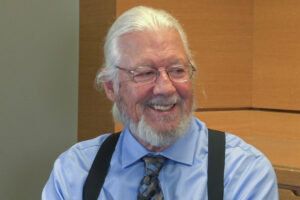Topic: Wet Walnut Creek

Interview of Leland (Lee) Rolfs, October 28, 2019
Interviewed by Rex Buchanan
In this oral history interview recorded in 2019, Lee Rolfs explains that few regulations governed water use when he began working at the Division of Water Resources of the State Board of Agriculture in 1978. He describes how the State responded to depletion of the Ogallala aquifer by creating Groundwater Management Districts (GMD) to manage future development, and to create a comprehensive system to address water issues. Rolfs recalls how the policy positions switched over time from the State being reluctant to regulate groundwater use when the GMDs initially sought restrictions to the opposite, with the GMDs opposing regulations Show Morewhen the State sought to impose them. He recalls his work on ground-breaking litigation with Colorado over water in the Arkansas River (Kansas v. Colorado). That case spanned over 25 years of his career with the State. Rolfs expounds on the Water Appropriation Act and its importance in the development of Kansas and its limitations in addressing the issue of long-term declines in the water table. He observes that cooperation, knowledge, and education are essential for properly managing water in Kansas. Show Less

Interview of Sam Brownback, December 2, 2024
Interviewed by Rex Buchanan
Sam Brownback reviews his service to Kansas beginning with his time as Kansas Secretary of Agriculture and extending through his terms as Governor. Brownback credits his upbringing on a farm in Linn County for development of his views on conservation and resource management. He recalled dealing with the farm crisis and water issues, particularly those involving the Ogallala Aquifer, during his tenure as Secretary of Agriculture. He described carrying his concern for water into his terms as Governor as a vision focused on long-term sustainability for the Ogallala. He also recalled using extensive public consultations to further policy Show Morechanges such as helping to eliminate the "use it or lose it" mentality in the approach to groundwater usage. Brownback described himself as a strong advocate for wind power, supporting development of wind farms, particularly in the central and western regions of the state. He also described extending the protection of the Flint Hills from wind farm development. In the interview, Brownback highlighted his pragmatic approach to policymaking and relationships developed during his public service career.
Highlights -- short excerpts from the interview
